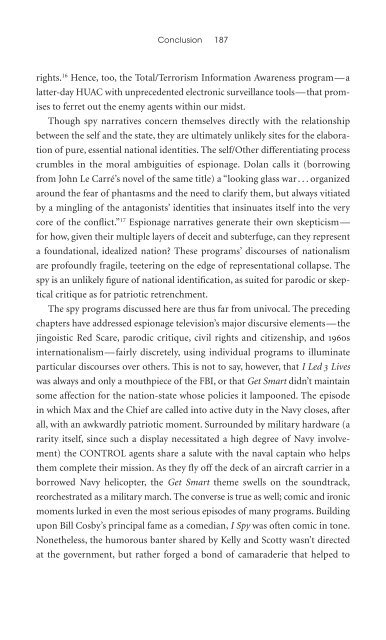Citizen-Spy
Citizen-Spy
Citizen-Spy
Create successful ePaper yourself
Turn your PDF publications into a flip-book with our unique Google optimized e-Paper software.
74 Parody and the Limits of Agency<br />
ridiculous notion. Or, to put it another way, the television spy of the 1960s is less<br />
the subject of a narrative of nationalism and increasingly is subjected to the will<br />
of the state. The contradictory discourses that undergird the 1950s spy programs’<br />
construction of the spy as a national agent begin to unravel in the programs<br />
that followed, confounding the possibility that the spy show might unproblematically<br />
define the ideal citizen.<br />
In many ways, the 1950s television spy narratives manifest what Daniel<br />
O’Hara calls the fascistic imagination—both by constructing an idealized masculine<br />
figure on whom rest the hopes and fears of the nation, and also by containing<br />
any expressions of cultural, racial, or gender difference within those narratives.<br />
2 These fantasies of absolute control, though, also bore traces of their own<br />
impossibility. The harried father/undercover agent in I Led 3 Lives is little more<br />
than a pawn, his sense of agency a fleeting, desperate myth; the man called “X” is<br />
nameless, invisible; the putative authority figure operating “behind closed doors”<br />
(the real agent, Admiral Zacharias) is but a place-holder, insufficient to the demands<br />
of the national narrative; and Mel Hunter has simply withered away.<br />
Part of what makes espionage narratives particularly revealing historical<br />
texts is this central tension, the possibility that the spy’s status as a national<br />
subject teeters on the edge of a “representational debacle.” <strong>Spy</strong> shows are more<br />
than icons of nationalistic prowess; they are also sources of intrigue and curiosity<br />
precisely because they reveal the limits of that prowess. <strong>Spy</strong> narratives’ myth<br />
of agency demands an unlikely and unstable reduction of state power to the<br />
figure of the individual agent. Thus while TV espionage narratives are often<br />
overdetermined, marked by the heavy-handed and unquestioning authority of<br />
the state, they are also shot through with “multiple misrecognitions” and unstable<br />
conflations—the representational logic that reduces the national to the<br />
individual collapses into self-referentiality and parody. 3<br />
This collapse is the product of a number of influences, and can’t be simply<br />
explained as the more or less inevitable formal and ideological devolution of a<br />
genre. It’s very difficult even to characterize spy programs as a genre proper;<br />
sporadic and inconsistent, these programs appeared in fits and spurts that were<br />
more closely linked to shifting cultural and political conditions than to a linear<br />
process of refinement, revision, and decay. The film genre criticism that emerged<br />
in the 1970s and 1980s—influenced by a blend of structuralist anthropology<br />
and Marxist cultural criticism—took as its principal object the iconic genres of



